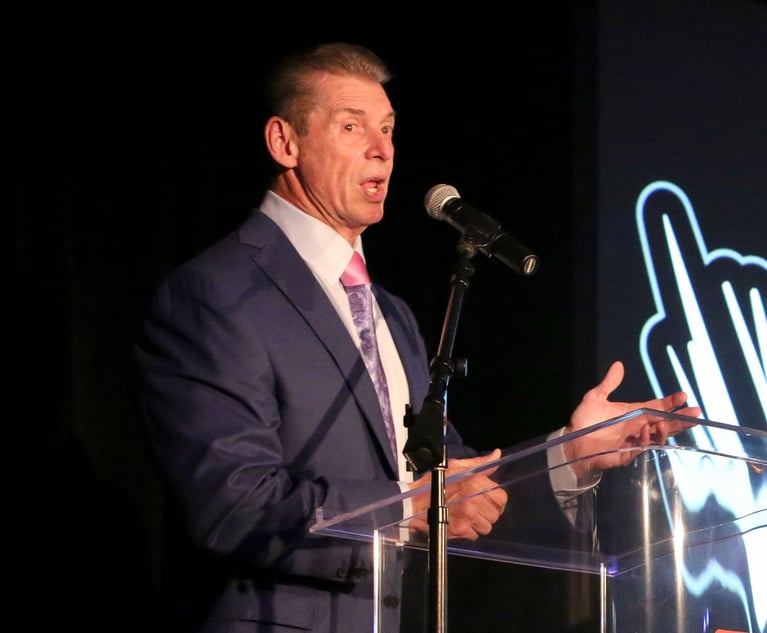 Karen Hoffman Lent and Kenneth Schwartz
Karen Hoffman Lent and Kenneth SchwartzAntitrust Division Reviews the ASCAP and BMI Consent Decrees, Creating the Possibility for Large Scale Change in the Music Industry
In their Antitrust Trade and Practice column, Karen Hoffman Lent and Kenneth Schwartz write: Last month, the DOJ announced its plans to review two music licensing antitrust consent decrees which have been in place, in some shape or form, for almost 80 years. Due to the newly-initiated review, the competitive mechanisms that dictate how music is broadcasted, streamed or played live could soon drastically change.
July 08, 2019 at 12:15 PM
10 minute read
Last month, the Department of Justice Antitrust Division (DOJ) announced its plans to review two music licensing antitrust consent decrees which have been in place, in some shape or form, for almost 80 years. Due to the newly-initiated review, the competitive mechanisms that dictate how music is broadcasted, streamed or played live could soon drastically change.
In 1941, the DOJ entered into two separate consent decrees with the American Society of Composers, Authors and Publishers (ASCAP) and Broadcast Music, Inc. (BMI)—the two largest performing rights organizations (PROs) in the United States, controlling nearly 90% of the market—to address competitive concerns arising from their significant market power. PROs, including ASCAP and BMI, distribute licenses to publicly perform musical works to entities, such as radio broadcasters, streaming services and live venues, that transmit the performance of musical works to listeners. In their current manifestations, the consent decrees require ASCAP and BMI to license the public performance rights to all musical works in their respective catalogues upon request and at a reasonable rate.
Upon conclusion of the newly initiated review, the DOJ has two options: (1) leave the consent decrees in place, in favor of consistency and predictability in the marketplace; or (2) modify or terminate the consent decrees, which may serve as a catalyst for wholesale reform of the music licensing rules currently in place. While it is difficult to predict what the DOJ might do, it is clear that modifying or terminating the decrees, even over time, would have far-reaching implications for the entire music industry.
|Public Performance Rights and Industry Background
The public performance right is just one of many copyrights in a recorded piece of music. It confers on its owner, typically the creator of a musical work such as a songwriter or a composer, the exclusive ability to play the composition in public, online or on the television or radio. Owners of public performance rights can grant others, via a license, permission to play the song as well. Songwriters and composers can also assign their copyrights to a publishing company and, in return, the company will then license and promote the compositions, help monitor where the compositions are used and collect royalties and distribute them to the composers. Songwriters, composers and music publishers can all agree to become members of a PRO, and then will receive royalties directly from that PRO instead of, for example, the radio station or venue where their composition was played.
As a result of the consent decrees, ASCAP and BMI can only distribute “blanket” licenses, which cover the entirety of their catalogues. They cannot license individual compositions and cannot charge different fees for different compositions. The licensing fees for the “blanket” license must be reasonable, and any pricing disputes are settled by a judge in the Southern District of New York. PROs cannot deny any request from music users to license their repertory of musical works.
|Consent Decrees in the Antitrust Context
A consent decree is a negotiated agreement between the government and a private party entered as a court order that is enforceable by the court. See Department of Justice Office of Public Affairs, Justice Department Releases Memorandum on Litigation Guidelines for Civil Consent Decrees and Settlement Agreements (Nov. 8, 2018). In the antitrust context, parties enter into consent decrees to mitigate regulatory concern over potential or actual market abuses. Consent decrees have the same effect as litigated decrees, binding the government and the consenting defendant to their terms. The DOJ has long maintained a practice of entering into consent decrees with defendants to resolve investigations, saving both parties the cost of litigation. Prior to 1979, antitrust consent decrees typically did not have temporal limitations. In 1979, the DOJ began the common practice of including “sunset” provisions, such that the decree ceases to have effect after a certain date, usually 10 years from entry of the judgment. Many of the consent decrees entered into before 1979 (including the music licensing consent decrees) still have no set expiration dates and remain open on courts' dockets even though the vast majority are likely outdated as a result of changes in industry conditions, economics, law or other reasons.
|Prior Review of the ASCAP and BMI Consent Decrees
Given that ASCAP and BMI control nearly 90% of the PRO market, their consent decrees essentially govern the competitive landscape for the licensing of public performance rights today. The consent decrees have been reviewed several times over the years, most recently in 2014 after ASCAP and BMI petitioned to modify them to allow writers and publishers to “partially withdraw” from the PROs in order to negotiate licensing deals directly with streaming services. The review involved two rounds of public comments and took over two years to complete before the DOJ ultimately concluded that it would make no formal changes to the music licensing rules.
Notably, in the 2014 review the DOJ reinterpreted the consent decrees to require “full-works” licensing, which would allow any one co-owner of a work to license all of the work without needing the permission of the other co-owners. Historically and currently, BMI and ASCAP operate under a fractional licensing model where each PRO collects for and pays out for only the shares of musical works it represents in its respective repertoire. Under the current fractional licensing model if, hypothetically, Paul Simon and Art Garfunkel each own 50% of “The Sound of Silence,” both Simon and Garfunkel have to agree to license their respective rights to the song. Under a “full-works” regime, either songwriter could license the full song without the permission of the other.
BMI and ASCAP objected to the DOJ's “full-works” licensing reinterpretation and sought clarification from the District Court. Ultimately, the case was appealed, and the Second Circuit disagreed with the DOJ, finding that because the consent decrees are silent on fractional licensing, PROs may offer them “unless a clear and unambiguous command of the decree would thereby be violated.” See United States v. Broadcast Music, Inc., 720 Fed. Appx.14 (2017).
|Why Now?
The DOJ's decision to initiate another review of the ASCAP and BMI consent decrees is likely the result of its current departmental initiatives, changes in the music industry and lingering questions about fractional and “full-works” licensing.
Last year, the DOJ announced it would review over one thousand open antitrust consent decrees. Assistant Attorney General Makan Delrahim articulated the motivation for the initiative, noting that the DOJ will “pursue the termination of outdated judgments around the country that presently do little more than clog court dockets, create unnecessary uncertainty for businesses or, in some cases, may actually elicit anticompetitive market conditions.” See Department of Justice Office of Public Affairs, Department of Justice Announces Initiative to Terminate “Legacy” Antitrust Judgments (April 25, 2018).
The DOJ's review of the ASCAP and BMI consent decrees is also motivated, in part, by the sweeping changes to the music industry brought on by the rise of streaming services. Streaming is often heralded as having “saved” the music industry. Where CD sales of music were in decline, leading to massive losses and layoffs, streaming services have created new revenue opportunities. They have also given listeners the opportunity to easily discover new, and perhaps niche, music.
Finally, the DOJ's review may answer lingering questions around fractional and “full-works” licensing raised by its most recent review. PROs, publishing companies and songwriters are generally opposed to the idea of “full-works” licensing, fearing that the music users who license works from their repertoires will shop for rate discounts among the co-owners of a musical work. On the other hand, music users, including digital services, argue that “full-works” licensing will increase free market competition.
|Possible Outcomes
The DOJ's review will address the music licensing regime in two ways, either (1) maintain the status quo, or (2) modify or terminate the consent decrees.
On the one hand, maintaining the status quo would enhance predictability and stability in the music industry, but may not update the consent decrees for the modern age or address open questions surrounding fractional licensing. Supporters of the status quo argue that the consent decrees create a stable regime that allows for the fair and efficient licensing of musical works. See, e.g., Future of Music Coalition, “ASCAP-BMI Consent Decrees Fact Sheet” (2016). They also argue that the consent decrees help mitigate anticompetitive behavior while ensuring that songwriters and music creators are paid when their music is played. Ultimately, proponents of the status quo argue that the modification or termination of the decrees would create chaos in the industry in the form of higher licensing fees that could be passed on to consumers.
On the other hand, supporters of modification or termination argue that a free market for music licensing would create a more productive, efficient and level playing field for all parties involved. As would be expected, ASCAP and BMI favor change. An ASCAP representative stated that altering the rules could lead to a “more flexible framework with less government regulation [which would] allow [it] to compete in a free market …” See Diane Bartz, U.S. Justice Department to Review 1941 ASCAP, BMI Consent Decrees, Reuters (June 5, 2019). Some supporters for change argue that the consent decrees should be terminated altogether, and view the consent decrees as “burdensome regulations which have unfairly devalued the work of thousands of songwriters for far too long.” See Anna Steele and Brent Kendall, Justice Department Opens Formal Review of Music-Licensing Rules, Wall St. J. (June 5, 2019). Yet, terminating the consent decrees would also terminate the antitrust protections afforded to ASCAP and BMI, which could raise serious competitive concerns given that the two PROs have such a large combined share in the market.
|Conclusion
Given that the industry has grown up around ASCAP and BMI, the DOJ has promised that it will not make any changes “lightly or without due care and consideration.” See Matthew Perlman, DOJ Again Mulling Decades-Old Music Licensing Orders, Law360.com (June 5, 2019). Additionally, President Trump recently signed the Music Modernization Act, which made major changes to the way streaming services pay mechanical royalties to songwriters when a musical work is reproduced. The Music Modernization Act was premised on the idea that PROs would continue to operate under the current licensing regime. Any major alteration to the consent decrees would seem to undermine whatever progress was achieved by passage of that Act.
In any event, the culmination of the DOJ's review will shed light on how it is choosing to use its resources. The DOJ has become increasingly interventionist, filing amicus briefs and initiating reviews of a wide range of long standing decrees. Should the DOJ choose to rewrite the ASCAP and BMI consent decrees, thus reinforcing its interventionist streak, future revisions and policy changes could be expected in other areas.
Karen Hoffman Lent and Kenneth Schwartz are partners at Skadden, Arps, Slate, Meagher & Flom. Tamar Lisbona, an associate at the firm, assisted in the preparation of this column.
This content has been archived. It is available through our partners, LexisNexis® and Bloomberg Law.
To view this content, please continue to their sites.
Not a Lexis Subscriber?
Subscribe Now
Not a Bloomberg Law Subscriber?
Subscribe Now
NOT FOR REPRINT
© 2024 ALM Global, LLC, All Rights Reserved. Request academic re-use from www.copyright.com. All other uses, submit a request to [email protected]. For more information visit Asset & Logo Licensing.
You Might Like
View All
SoundCloud GC Takes Legal Reins of Condé Nast at Tumultuous Time

With SDNY Stay Lifted, Sex Trafficking Civil Suit Against Vince McMahon, WWE Gets Green Light
3 minute read
Big Tech and Internet Companies Slammed With Consumer Class Actions in December

Trending Stories
- 1Mental Health Issues Don’t Get a Holiday
- 2'It's Got to Be a Wake-Up Call:' Atlanta Attorney Hopes $16M Verdict Spurs Training Changes at Hotels
- 3FTC Bans 'Junk Fees' in Live-Event Tickets and Short-Term Lodging
- 4California Legal Awards Moving to Mid-Summer Date in 2025, Adds New Categories
- 5Law Student Sues NY Attorney Grievance Officials, Seeking Materials Over Sexual Assault Claims
Who Got The Work
Michael G. Bongiorno, Andrew Scott Dulberg and Elizabeth E. Driscoll from Wilmer Cutler Pickering Hale and Dorr have stepped in to represent Symbotic Inc., an A.I.-enabled technology platform that focuses on increasing supply chain efficiency, and other defendants in a pending shareholder derivative lawsuit. The case, filed Oct. 2 in Massachusetts District Court by the Brown Law Firm on behalf of Stephen Austen, accuses certain officers and directors of misleading investors in regard to Symbotic's potential for margin growth by failing to disclose that the company was not equipped to timely deploy its systems or manage expenses through project delays. The case, assigned to U.S. District Judge Nathaniel M. Gorton, is 1:24-cv-12522, Austen v. Cohen et al.
Who Got The Work
Edmund Polubinski and Marie Killmond of Davis Polk & Wardwell have entered appearances for data platform software development company MongoDB and other defendants in a pending shareholder derivative lawsuit. The action, filed Oct. 7 in New York Southern District Court by the Brown Law Firm, accuses the company's directors and/or officers of falsely expressing confidence in the company’s restructuring of its sales incentive plan and downplaying the severity of decreases in its upfront commitments. The case is 1:24-cv-07594, Roy v. Ittycheria et al.
Who Got The Work
Amy O. Bruchs and Kurt F. Ellison of Michael Best & Friedrich have entered appearances for Epic Systems Corp. in a pending employment discrimination lawsuit. The suit was filed Sept. 7 in Wisconsin Western District Court by Levine Eisberner LLC and Siri & Glimstad on behalf of a project manager who claims that he was wrongfully terminated after applying for a religious exemption to the defendant's COVID-19 vaccine mandate. The case, assigned to U.S. Magistrate Judge Anita Marie Boor, is 3:24-cv-00630, Secker, Nathan v. Epic Systems Corporation.
Who Got The Work
David X. Sullivan, Thomas J. Finn and Gregory A. Hall from McCarter & English have entered appearances for Sunrun Installation Services in a pending civil rights lawsuit. The complaint was filed Sept. 4 in Connecticut District Court by attorney Robert M. Berke on behalf of former employee George Edward Steins, who was arrested and charged with employing an unregistered home improvement salesperson. The complaint alleges that had Sunrun informed the Connecticut Department of Consumer Protection that the plaintiff's employment had ended in 2017 and that he no longer held Sunrun's home improvement contractor license, he would not have been hit with charges, which were dismissed in May 2024. The case, assigned to U.S. District Judge Jeffrey A. Meyer, is 3:24-cv-01423, Steins v. Sunrun, Inc. et al.
Who Got The Work
Greenberg Traurig shareholder Joshua L. Raskin has entered an appearance for boohoo.com UK Ltd. in a pending patent infringement lawsuit. The suit, filed Sept. 3 in Texas Eastern District Court by Rozier Hardt McDonough on behalf of Alto Dynamics, asserts five patents related to an online shopping platform. The case, assigned to U.S. District Judge Rodney Gilstrap, is 2:24-cv-00719, Alto Dynamics, LLC v. boohoo.com UK Limited.
Featured Firms
Law Offices of Gary Martin Hays & Associates, P.C.
(470) 294-1674
Law Offices of Mark E. Salomone
(857) 444-6468
Smith & Hassler
(713) 739-1250






